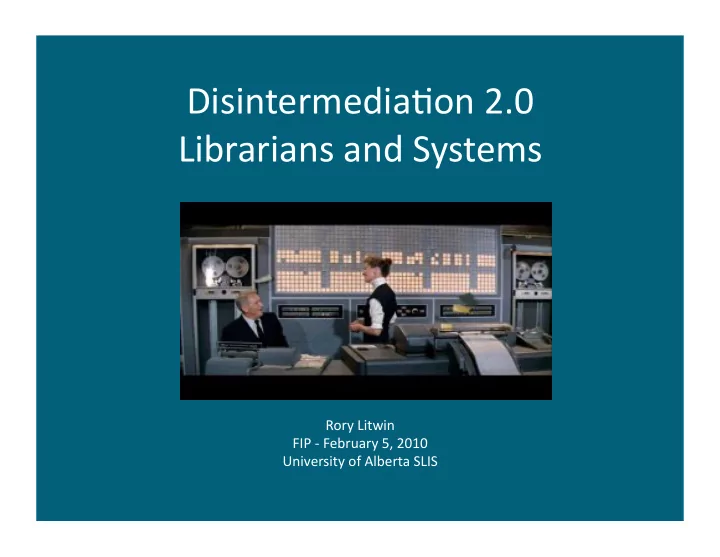

Disintermedia+on 2.0 Librarians and Systems Rory Litwin FIP ‐ February 5, 2010 University of Alberta SLIS
Please Ask Ques+ons • Please feel free to raise your hand as I am speaking, and I will call on you. • It is okay if we stray from my outline a bit.
Outline of talk • Desk Set – Librarianship versus Informa+on Science, circa 1957 – Jesse Shera at Western Reserve University in the 1950’s • Disintermedia+on / Re‐media+on – Disintermedia+on defined, and discussion of examples – Why disintermediate? – Essence of disintermedia+on in quan+fica+on – Idea of Re‐Media+on / shiW of control – where does it go?
Outline of talk, cont. • Disintermedia+on 2.0 – The Boolean tool versus the intelligent search assistant – Re‐Media+on con+nued via ar+ficial intelligence – Some specific AI‐based applica+ons we know – Problem: Embedded assump+ons – Problem: Lack of context – Problem: Predic+ng without understanding the person • From data to wisdom? • The law of the instrument • Autonomy and authen+city
Desk Set Computers and libraries in 1957 Jesse Shera at Western Reserve The dawn of “LIS” Will we be replaced by mechanical brains?
Disintermedia+on • Travel agents / Expedia and the like • Accountants / Turbotax • Print shops / desktop publishing • Astrologers / astrology soWware • Librarians / internet (to put it simply)
Why disintermediate? • Scale up to a bigger user base • Scale up to the amount of info being produced • Self‐service • Remote service • Save money by employing fewer people(?) • Empower the user(?)
Quan+fica+on • Computers are coun+ng machines • Disintermedia+on is done through quan+ta+ve methods (scaling up is mul+plica+on) • Quan+ta+ve ques+ons become data for processing • Other ques+ons drop out of the system • Disintermedia+on and logical posi+vism (Codified knowledge is separated from the person)
Re‐Media+on • Re‐Media+on as an alternate concep+on of disintermedia+on – Users’ choices are guided and circumscribed – Knowledge is codified and decisions embedded in soWware in ways that can have consequences – Alterna+ve professional answers and methods less available – Perhaps driven more by point‐of‐view than by any conscious agenda – ShiW of control from professionals to management & technicians (meaning deprofessionaliza+on) – (Thanks to Mary Bryson for the word Re/Media+on)
Disintermedia+on 2.0 • Ar+ficial intelligence • Personal search assistants • Seman+c web • Automated reasoning systems • Bots • Data mining • Target marke+ng • “Smart” products • Natural language ques+on processing
Disintermedia+on 2.0 Disintermedia+on 1.0: The Boolean tool Users have access to a huge amount of informa+on, but need to know how to navigate their way through Disintermedia+on 2.0: The AI‐based search assistant The system tries to do some of the user’s thinking for him
Re‐Media+on 2.0 • What does Disintermedia+on 2.0 look like through the lens of Re‐Media+on? • Who programs the “mechanical brains,” who pays them, and what is their agenda? • Who is this Jeeves, and can I trust him?
Some specific applica+ons • The Next‐Gen library catalog • The recommender engine • Tracking‐based target marke+ng • Smarter search engines / personalized results • Wolfram Alpha and the like • Customer service phone robots (perhaps not ready yet)
Scholarly recommender engines Uhh, Hey Beavis… This scholarly recommender service wants me to rate this ar+cle…
Problem: Embedded Assump+ons • Systems you interact with either: – Assume you are like the “average” person or – Make assump+ons based on your data‐mined “profile” • Jeeves, or your personal shopper or whatever, cannot SEE you. • We are pushed into manifes+ng iden++es defined as market niches.
Problem: Lack of Context • Reference librarians understand informa+on needs with the help of the context of the ques+on. • Context is the ground for intui+on and insight, as well as meaning. • Automated systems (and informa+on scien+sts) typically follow the posi+vist assump+on that “facts” and ontologies have meaning without a context. • (Context: +me, place, person, culture, situa+on)
Problem: Predic+ng Without Understanding • AI: Brute force predic+on, crunching user data. • Human intermediary: An “If I were you in this situa+on” understanding. • Example: Recommender engine. • Example: Smart search engine.
Info‐Sci Hierarchy of Informa+on • Data – Informa+on – Knowledge – Understanding – Wisdom (Russell Ackoff's concep+on of informa+on) This concep+on assumes that human experience is reducible to an accumula+on of “data” that can be processed by a computer just as by a person’s mind. i.e. at bokom we are bits and bytes. If not, what are some other ways of thinking about thinking, and what are the implica+ons for informa+on studies?
The Law of the Instrument • "Give a small boy a hammer, and he will find that everything he encounters needs pounding.” Abraham Kaplan, in The conduct of inquiry: Methodology for behavioral science , p. 28 (1964)
Autonomy and Authen+city • Heidegger’s concept of Das Man • Are we defined by marke+ng concepts? Shunted along paths? • Does the recommender engine care about the individuality of our research needs? • How is the process directed? • Is the appeal of self‐service interfaces about our desire for autonomy? Is it a false promise? • What is the connec+on between interpersonal interac+on and authen+city? • Do the reflec+ons of user data offer a way of authen+cally knowing and being ourselves, or do they get in the way? • What is an individual you meet in person versus an individual as represented in the data network?
Recommend
More recommend